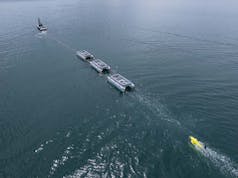It is claimed that a ‘culture change’ is needed at the Ministry of Defence to ensure SMEs in Scotland receive a fair share of defence contracts.
The Scottish Affairs Committee argues in a new report that small and medium enterprises (SMEs) in Scotland are being overlooked by the Ministry of Defence (MOD) and its prime contractors when they select companies to fulfil defence contracts.
This is despite Scottish industry having the skills and ambition to match any other part of the UK and the nation being pivotal to the UK’s military infrastructure. While nearly 10% of the MOD’s spending with industry is spent in Scotland, this spending is heavily skewed towards major international prime contractors. Spending with Scottish SMEs accounted for only 2.5% of the MOD’s total spending with SMEs in 2020/21.
The Committee heard how Scottish SMEs find it “extremely difficult” to access the UK defence sector and that “culture change is required” to address UK disparities in spending.
“Defence in Scotland is however a positive story to tell. In its report, Defence in Scotland: military landscape, the Committee highlights evidence that Scotland’s diverse military capabilities are vital to the UK, for example, RAF Lossiemouth’s role in intercepting foreign aircraft in UK airspace. Scottish bases – such as HMNB Clyde and RAF Lossiemouth – are already benefiting from increased funding the UK Government has allocated to defence this Parliament. This funding is having a positive impact on communities and local economies around bases.”
The report also states:
“The Committee considered the impact of military personnel and their families moving between bases in Scotland and the rest of the UK. The Committee heard how moves can be disruptive for individuals and families adjusting to different education and healthcare systems, and different tax rates. As discussed with UK Defence Minister Baroness Goldie at an evidence session, difficulties transferring professional qualifications such as teaching can be a barrier for Armed Forces families moving between England and Scotland. To ease this burden, the Committee recommends that the MOD conduct a review of the information it shares with military personnel moving to bases in Scotland and accelerates efforts to reduce barriers regarding the transfer of professional qualifications.”
The UK Government has announced its goal to reduce the defence estate by 30% by 2040, creating fewer and larger sites. The Committee collected evidence that the impacts of base closures in Scotland can vary depending on location.
“In prosperous areas, bases can become much-needed sites for housing or businesses but, in less affluent areas, the consequences can be damaging and long-lasting, with instances where local people need to leave the area to seek new employment opportunities. To mitigate negative impacts, the Committee recommends that the MOD intensifies its collaboration with Scottish local authorities, including engagement at earlier stages, and that impact assessments for proposed base closures and major expansions be compiled and acted on.”
Scottish Affairs Committee Chair Pete Wishart MP said:
“Scotland’s contribution to UK defence is undeniable. Our varied Scottish defence estate, ranging from land, sea and air, are pivotal to UK security and vital to our military allies. It’s brilliant news that the UK Government’s increased defence spending is benefiting MOD bases and local communities in Scotland.
Scotland’s impressive reputation in defence can be enhanced further if more Scottish SMEs are engaged by the MOD to fulfil UK defence orders. The overlooking of Scottish SMEs must change so that different areas of the UK can benefit and contribute to our national security, and allow more local economies to thrive.
The MoD must acknowledge the numerous barriers that Armed Forces personnel and their families are facing when they move between UK bases. This is an issue likely to be exacerbated with base closures and expansions elsewhere, in Scotland and around the UK, as the MOD looks to reduce its defence estate by 30%. Guidance on differing healthcare and education services, tax and even transferring professional qualifications needs to be reassessed to make sure moves are as smooth as possible.”
In its report, the Committee also requests clarity on the UK Government’s policy on military shipbuilding procurement: an issue that will likely be revisited in its inquiry ‘Defence in Scotland: Military Shipbuilding’.













All wonderful to spread the love around but why are you going to buy your widgets from the new ABC rather than the untested XYZ for a critical application when there is risk involved in this.
A lot of stuff is bought in tiny quantities but needs replacing periodically.
There is also the major problem of the constant siren calls for independence so the supply chain is probably mostly where the manufacturing sites might well end up having to be moved to. I appreciate the SNP’s wishful thinking is that they go independent and keep all the MOD work but everyone has been clear that won’t happen.
To true… But as the Scottish proverb says ”If wishes were horses; then beggars would ride…”
The SNP have proven they are unable to run an economy.
They are fully aware that the ship building will cease IF independence happens.
They saw before the 1st vote, hard evidence of companies moving corporate HQs to the south…
But still, they sit with their collectives heads buried in the sand…
” The SNP have proven they are unable to run an economy” That is a big Vladimir backed up with no evidence. I take it you are unaware that by law Scotland must run a deficit free budget,
Not according to the Scot Gov website…
https://www.gov.scot/news/balanced-budget-despite-pandemic-pressures/#:~:text=The%202020%2D21%20Provisional%20Budget,every%20penny%20allocated%20in%20full.
this is something that is being looked at UK wide, not just Scotland. The argument is that the MOD go straight to a number of large suppliers, rather than looking at what smaller company’s can supply
Only 5% of MoD industrial spending went to SMEs. arguing over the proportion that went to Scottish SMEs misses the point.
If the MoD prefers to work with bigger players, perhaps the way ahead for SMEs lies within consortia so they can compete for the big bucks rather than squabble over leftovers.
Hang on there.
The MOD doesn’t buy a T31 or whatever ship as a bag-of-bits self build: it buys it from an integrator who takes responsibility for putting the thing together and getting to work as specified.
You then, tend, to go back to the integrator to buy the replacement parts. There can be good reasons for this such as warranty or substitute parts suitability to critical/safety systems. Small SME’s can and do go out of business and sourcing replacement parts is sometimes non trivial for critical systems.
Then on top of that, stir in the Duty Holder system and there isn’t much willingness to swap parts if there is any safety risk involved. Getting someone to sign off on a parts substitution may well be more costly than buying the parts from the designer/aggregator!
True. But not everything is as complex or expensive as a Type 31. The consortium acts as the integrator and as the single point of contact, and it’s their responsibility to ensure ongoing support and maintenance — if that’s part of the contract. Just like the carriers were built and purchased from a consortium, but on a far smaller scale.
There would be issues with sourcing projects this way, no doubt about it, but there are also pretty big issues with single sourcing from a large company, or you’d just go to BAES for everything.
The upsides include increased competition, lower prices, and the ability to grow small businesses within the UK.
So 2.5% out of 5% of the mod total procurement budget?
That can’t be much. Maybe caramel wafers is all they buy
Anyone know the name/location of the shipyard pictured at the top of the story? 🤔